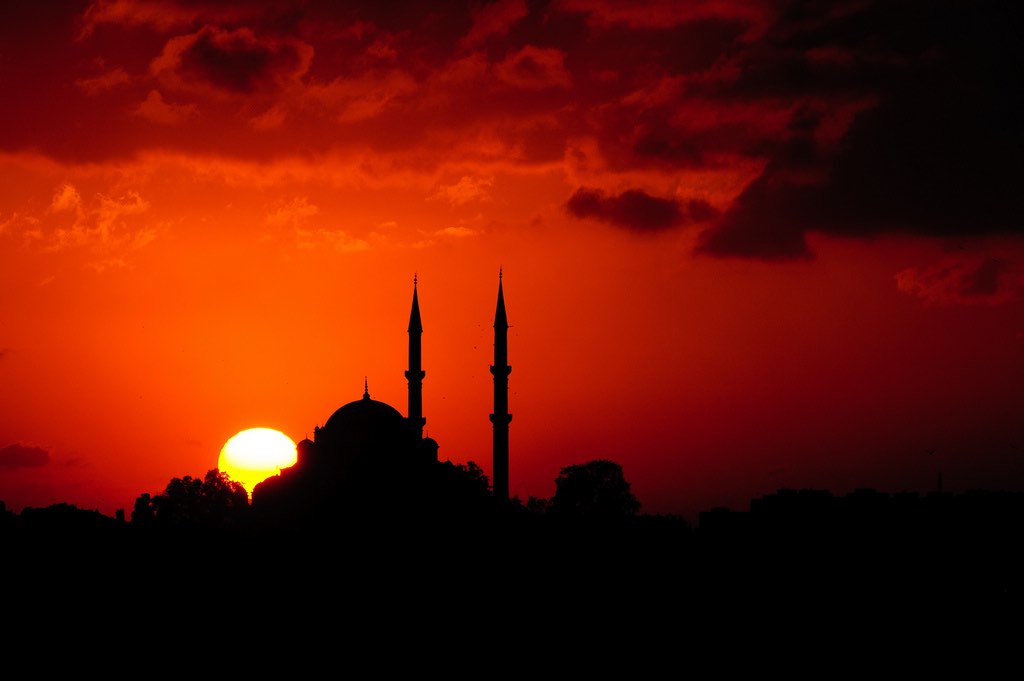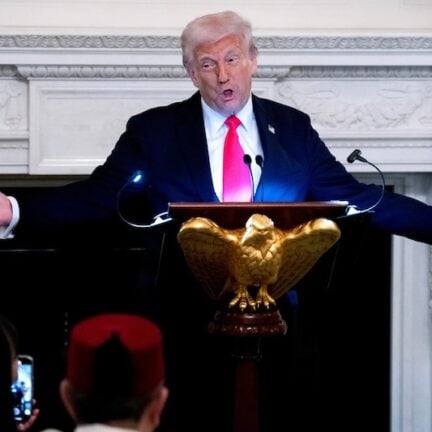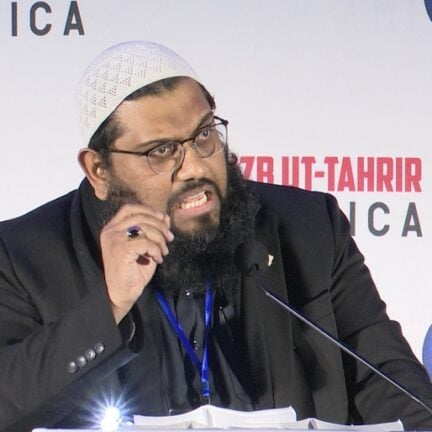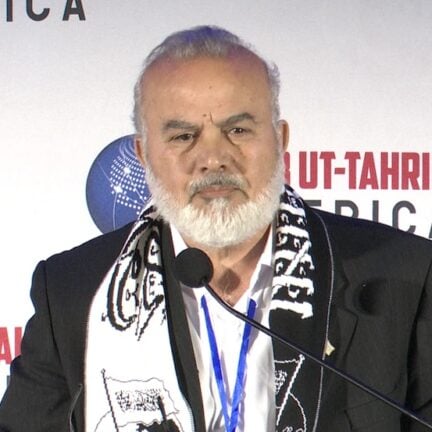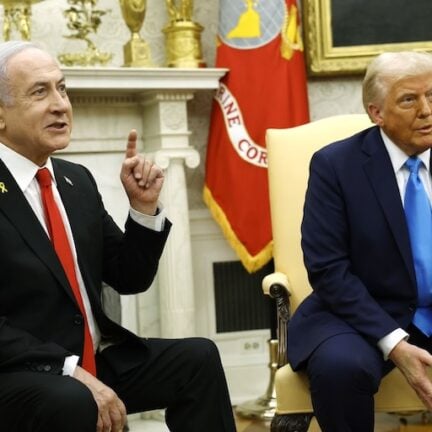Already 97 years have passed since the collapse of the Ottoman Caliphate, from the time when the Ummah has lost its shield and support. After which the West attacked the Muslim lands as a predator attacked its prey. However, sincere men among the sons of the Ummah did not stay aloof, they resisted the West, and to this day the confrontation between the Ummah and the West does not stop.
Despite the fact that the presence of the state of the Khilafah is a Sharia fardh, there are obscurantists still propagandizing that in this matter, Allah gave the full right to man to choose his own system, be it a republic, a federation, a kingdom, etc.
Therefore, I want to remind them that the Caliphate is a Divine system sent down from heaven. Proof of this are:
(وَإِذْ قَالَ رَبُّكَ لِلْمَلَائِكَةِ إِنِّي جَاعِلٌ فِي الْأَرْضِ خَلِيفَةً قَالُوا أَتَجْعَلُ فِيهَا مَن يُفْسِدُ فِيهَا وَيَسْفِكُ الدِّمَاءَ وَنَحْنُ نُسَبِّحُ بِحَمْدِكَ وَنُقَدِّسُ لَكَ قَالَ إِنِّي أَعْلَمُ مَا لَا تَعْلَمُونَ)
“And [mention, O Muhammad], when your Lord said to the angels, “Indeed, I will make upon the earth a successive authority (calif).” They said, “Will You place upon it one who causes corruption therein and sheds blood, while we declare Your praise and sanctify You?” Allah said, “Indeed, I know that which you do not know.” [Al-Baqara: 30]
Imam Qurtubi (died 671 AH) commenting on this verse said:
هذه الآية أصل في نصب إمام وخليفة يسمع له ويطاع، لتجتمع به الكلمة، وتنفذ به أحكام الخليفة. ولا خلاف في وجوب ذلك بين الأمة ولا بين الأئمة إلا ما روي عن الأصم حيث كان عن الشريعة أصم، وكذلك كل من قال بقوله واتبعه على رأيه ومذهبه، قال: إنها غير واجبة في الدين بل يسوغ ذلك، وأن الأمة متى أقاموا حجهم وجهادهم، وتناصفوا فيما بينهم، وبذلوا الحق من أنفسهم، وقسموا الغنائم والفيء والصدقات على أهلها، وأقاموا الحدود على من وجبت عليه، أجزأهم ذلك، ولا يجب عليهم أن ينصبوا إماما يتولى ذلك.(الجامع لأحكام القرآن)
“This verse is the basis for the appointment of the Imam and the Caliph, who are obeyed, by means of which unity is established, and through him acts of the caliph himself are pretending. And there is no disagreement among the Ummah and the imams about the mandatory election of the Caliph. Only Abu Bakr-Assam (translated as deaf) had a different opinion, because he was also deaf in the Shariah. This opinion was also shared by those who followed him. Abu Bakr Asamm said: “He (the Caliphate) is not obligatory in religion, on the contrary – it is allowed. If the Ummah began to perform: their duties and jihad; When there is justice between people; they perform the duties that are on them; share trophies, and booty’s; gives alms to those who deserve them; when the Ummah can carry out the system of punishments that are entrusted as an obligation to it, then in that case it is allowed to elect the Caliph. However, it is not the wajib for them to elect an imam in order for him to do all this “(Al-Jami’u li Ahkam il-Quran).
Ibn Kathir commented on the same verse:
وقد استدل القرطبي وغيره بهذه الآية على وجوب نصب الخليفة ليفصل بين الناس فيما يختلفون فيه، ويقطع تنازعهم، وينتصر لمظلومهم من ظالمهم، ويقيم الحدود، ويزجر عن تعاطي الفواحش، إلى غير ذلك من الأمور المهمة التي لا يمكن إقامتها إلا بالإمام، وما لا يتم الواجب إلا به فهو واجب.(تفسير القرآن العظيم)
“Imam Qurtubi and others used this verse as proof of the obligatory election of the Caliph, so that he resolved the differences, litigation, strife that arose between people, defended the oppressed from the oppressor, set up the system of punishments, to withhold from abominations.
Imam is also necessary for the implementation of other very important things, the implementation of which is impossible without him. Therefore, what is necessary to carry out the wajib – itself becomes a wajib” (Tafsir ul-Quran il-azim).
Fakhruddin Razi in tafsir of 38 ayah of the fifth Surah said:
احتج المتكلمون بهذه الآية في أنه يجب على الأمة أن ينصبوا لأنفسهم إماما معينا ، والدليل عليه أنه تعالى أوجب بهذه الآية إقامة الحد على السراق والزناة ، فلا بد من شخص يكون مخاطبا بهذا الخطاب ، وأجمعت الأمة على أنه ليس لآحاد الرعية إقامة الحدود على الجناة ، بل أجمعوا على أنه لا يجوز إقامة الحدود على الأحرار الجناة إلا للإمام ، فلما كان هذا التكليف تكليفا جازما ولا يمكن الخروج عن عهدة هذا التكليف إلا عند وجود الإمام ، وما لا يتأتى الواجب إلا به – وكان مقدورا للمكلف – فهو واجب ، فلزم القطع بوجوب نصب الإمام حينئذ.(التفسير الكبير)
“The Mutakallims took this verse as the argument that for the Ummah it is the wajib to appoint an imam for Ummah self. The proof of this is that the Almighty made it a duty through this verse, the implementation of punishment for thieves and adulterers. And it is necessary to have the person to whom these verses are addressed (about punishments). The Ummah is unanimous in that individuals cannot impose penal laws on criminals. It is also unanimous that only the imam has the right to implement a system of punishment over free people who are criminals.
Therefore, it is necessary to have an imam, since this instruction is categorical and there is no other way to absolve oneself of the responsibility for implementing the laws. The only one who will take it upon himself is the Imam. In this connection, what is necessary to carry out the wajib – itself becomes a wajib (provided that it is feasible for mukallafa). And so, the election of the imam is the reason for the implementation of the law on cutting off the hand”. (Tafsir ul-Kabir).
It is narrated from Abu Hazm: “I was with Abu Hurayra for five years and heard from him a hadeeth:
«كَانَتْ بَنُو إِسْرَائِيلَ تَسُوسُهُمُ الْأَنْبِيَاءُ، كُلَّمَا هَلَكَ نَبِيٌّ خَلَفَهُ نَبِيٌّ، وَإِنَّهُ لَا نَبِيَّ بَعْدِيي، وَسَتَكُونُ خُلَفَاءُ فَتَكْثُرُ، قَالُوا: فَمَا تَأْمُرُنَا؟ قَالَ: فُوا بِبَيْعَةِ الْأَوَّلِ، فَالْأَوَّلِ، وَأَعْطُوهُمْ حَقَّهُمْ، فَإِنَّ اللَّهَ سَائِلُهُمْ عَمَّا اسْتَرْعَاهُمْ»
“The prophets reigned over the sons of Israel. When one prophet was dying, the next one came after him. After me there will be no prophets, but there will be caliphs, and there will be many.” The audience asked: “What will you order us to do?”. To this the Messenger of Allah (saw) replied: “Observe the oath of the first, then again the first, and give them their rights. Verily, Allah will ask them for what He gave them under their responsibility.” (Bukhari, Muslim)
It is narrated from Nafi, who said: “Abdullah ibn Umar told me that he heard the Prophet (saw) say:
«مَنْ خَلَعَ يَدًا مِنْ طَاعَةٍ لَقِيَ اللَّهَ يَوْمَ الْقِيَامَةِ لا حُجَّةَ لَهُ وَمَنْ مَاتَ وَلَيْسَ فِي عُنُقِهِ بَيْعَةٌ مَاتَ مَيْتَةً جَاهِلِيَّةً»
“Those who depart from the subjugation, will meet Allah in the Day of Judgment, without justification, and those who died without an oath, died the death of the times of ignorance” (Muslim).
It is narrated from Numan ibn Bashir of Huzaifa (ra) that the Messenger (saw) said:
«تَكُونُ النُّبُوَّةُ فِيكُمْ مَا شَاءَ اللَّهُ أَنْ تَكُونَ، ثُمَّ يَرْفَعُهَا إِذَا شَاءَ أَنْ يَرْفَعَهَا، ثُمَّ تَكُونُ خِلَافَةٌ عَلَى مِنْهَاجِ النُّبُوَّةِ، فَتَكُونُ مَا شَاءَ اللَّهُ أَنْ تَكُونَ، ثُمَّ يَرْفَعُهَا إِذَا شَاءَ أَنْ يَرْفَعَهَا، ثُمَّ تَكُونُ مُلْكًا عَاضًّا، فَيَكُونُ مَا شَاءَ اللَّهُ أَنْ يَكُونَ، ثُمَّ يَرْفَعُهَا إِذَا شَاءَ الله أَنْ يَرْفَعَهَا، ثُمَّ تَكُونُ مُلْكًا جَبْرِيّاً، فَتَكُونُ مَا شَاءَ اللَّهُ أَنْ تَكُونَ، ثُمَّ يَرْفَعُهَا إِذَا شَاءَ أَنْ يَرْفَعَهَا، ثُمَّ تَكُونُ خِلَافَةٌ عَلَى مِنْهَاجِ النُّبُوَّةِ، ثُمَّ سَكَتَ»
“Prophethood will remain amongst you for as long as Allah wills it to be. Then Allah will raise it when He wills to raise it (meaning the Prophet will die). Then there will be the Khalifah upon the Prophetic methodology. And it will last for as long as Allah wills it to last. Then Allah will raise it when He wills to raise it. Then there will be biting kingship, and it will remain for as long as Allah wills it to remain. Then Allah will raise it when He wills to raise it. Then there will be tyrannical (forceful) kingship and it will remain for as long as Allah wills it to remain. Then He will raise it when He wills to raise it. Then there will be a Khalifah upon the Prophetic methodology.” Then he (the Prophet) was silent. (Musnad Imam Ahmad, v/273, at-Tabarani, Abu Daud Tiyalisi)
There are also a huge number of statements by scholars of our Ummah:
– Sagduddin Taftazany ((712) 722-792gg. (Hanafit)) in the comments to the book “Al-Akaydun-nasafiyya” said:
ثم الإجماع على أن نصب الإمام واجب وإنما الخلاف في أنه هل يجب على الله تعالى أو على الخلق بدليل سمعي أو عقلي.
والمذهب أنه يجب على الخلق سمعاً، لقوله عليه السلام: «من مات ولم يعرف إمام زمانه مات ميتة جاهلية». ولأن الأمة قد جعلوا أهم المهمات بعد وفاة النبي عليه السلام نصب الإمام حتى قدموه على الدفن، وكذا بعد موت كل إمام، ولأن كثيراً من الواجبات الشرعية يتوقف عليه كما أشار إليه بقوله: «والمسلمون لا بد لهم من إمام يقوم بتنفيذ أحكامهم وإقامة حدودهم وسد ثغورهم وتجهيز جيوشهم وأخذ صدقاتهم وقهر المتغلبة والمتلصصة وقطاع الطريق وإقامة الجمع والأعياد وقطع المنازعات الواقعة بين العباد وقبول الشهادات القائمة على الحقوق وتزويج الصغار والصغائر الذين لا أولياء لهم وقسمة الغنائم» ونحو ذلك من الأمور التي لا يتولاها آحاد الأمة
“The unanimity of ulama is that the election of an imam is a wajib. Disagreement (among them) only is that this wajib comes from Allah or from creatures, i.e. on the basis of Sharia or on the basis of reason. Madhhab (Ahlyus-Sunnah) is that this is based on Sharia wajib:
1. Because of the words of the Prophet (saw):
«وَمَنْ مَاتَ وَلَيْسَ فِي عُنُقِهِ بَيْعَةٌ مَاتَ مَيْتَةً جَاهِلِيَّةً»
“Whoever died, not knowing the imam of his time, died the death of the times of jahiliya.”
2. Because the Ummah made the election of the Imam the most important thing after the death of the Prophet (saw), even placing this election/process in the first place, rather than a funeral!
And so it continued after the death of every imam, because (implementation) of the majority of Shariah wajib depends on the imam, as stated by the author (Najmuddin Umar Nasafi), saying: “Muslims need an imam to enforce rules and laws, enforcement of the penal system, defend their borders, trained their army, collect their donations and taxes, provide security from rapists, thieves, robbers, spent Friday and holiday prayers, eliminate disputes, arising ie between people, take evidence, rights-based, make the marriage of young boys and girls who have no guardians, distributed the trophies (war booties).” And similar things that certain representatives of the Ummah are unable to accomplish.”
– Ahmad ibn Hajar Khaytami (909-974 (shafiit)) in the book, “Savagykul-Mukhrika” said:
اعلم أيضاً أن الصحابة رضوان الله عليهم أجمعوا على أن نصب الإمام بعد انقراض زمن النبوة واجب بل جعلوه أهم الواجبات حيث اشتغلوا به عن دفن الرسول (ص). (الصواعق المحرقة)
“So know that absolutely all the Companions (may Allah be pleased with them) have unanimously agreed that the election of the Imam after the end of the period of prophecy is a Wajib. They even made him the most important wajib among the rest when they occupied themselves with the election of the imam, leaving the funeral of the Messenger of Allah (sas).”
– Ibn Hazm (384-456 on hijra (zahirit)) in the book “Al-Fasl fil-mileval-ahvayvan-nihal” said:
اتفق جميع أهل السنة، وجميع الشيعة، وجميع الخوارج على وجوب الإمامة، وأن الأمة واجب عليها الانقياد لإمام عادل يقيم فيها أحكام الله، ويسوسهم بأحكام الشريعة التي أتى بها رسول الله (ص). (الفصل في الملل والأهواء والنحل
“All the Aulus-Sunnah, all murgisites, all Shi’ites, all Khawarijas (except for the group of the nazhdites from among them) are unanimous in the necessity of having an Imamate. And for the Ummah is wajib to obey a just Imam, which implements the laws of Allah over them, and rules on the basis of Sharia law, which came to the Messenger of Allah (pbuh).”
– Ibn Taymiyyah (661-725 on hijra (khanbalit)) in the book Majmu’ ul-Fatawa said:
يجب أن يعرف أن ولاية أمر الناس من أعظم واجبات الدين بل لا قيام للدين إلا بها…لأن الله أوجب الأمر بالمعروف والنهي عن المنكر، ولا يتم ذلك إلا بقوة وإمارة، وكذلك سائر ما أوجبه من الجهاد والعدل وإقامة الحج والجمع والأعياد ونصر المظلوم، وإقامة الحدود لا تتم إلا بالقوة والإمارة. ولهذا روي أن السلطان ظل الله في الأرض، ويقال : «ستون سنة من إمام جائر أصلح من ليلة واحدة بلا سلطان» والتجربة تبين ذلك. فالواجب اتخاذ الإمارة دينا وقربة يتقرب بها إلى آلله، فإن التقرب إليه فيها بطاعته وطاعة رسوله من أفضل القربات، وإنما يفسد فيها حال أكثر الناس لابتغاء الرياسة أو المال بها.
ولهذا أمر النبي (ص) أمته بتولية ولاة أمور عليهم وأمر ولاة الأمور أن يردوا الأمانات إلى أهلها؛ وإذا حكموا بين الناس أن يحكموا بالعدل وأمرهم بطاعة ولاة الأمور في طاعة الله تعالى؛ ففي سنن أبي داود عن أبي سعيد أن رسول الله (ص) قال: «إذا خرج ثلاثة في سفر فليؤمروا أحدهم». وفي سننه أيضا عن أبي هريرة مثله. وفي مسند الإمام أحمد عن عبد الله بن عمر أن النبي (ص) قال: «لا يحل لثلاثة يكونون بفلاة من الأرض إلا أمروا أحدهم».
فإذا كان قد أوجب في أقل الجماعات وأقصر الاجتماعات أن يولى أحدهم: كان هذا تنبيها على وجوب ذلك فيما هو أكثر من ذلك؛ ولهذا كانت الولاية ء لمن يتخذها دينا يتقرب به إلى الله ويفعل فيها الواجب بحسب الإمكان ء من أفضل الأعمال الصالحة حتى قد روى الإمام أحمد في مسنده عن النبي (ص) أنه قال: «إن أحب الخلق إلى الله إمام عادل وأبغض الخلق إلى الله إمام جائر».
“It is necessary to know that the management of people’s affairs is one of the greatest duties of religion. Moreover, the practice of religion and the conduct of worldly affairs are not possible without leading the affairs of people … Allah ordered to order the approved and to prohibit the reproved, and this is possible only through the strength and availability of the Imarat (i.e. Islamic state).
Similarly, the practice of other mandatory things like: jihad, justice, hajj, Friday and festive prayers, helping the oppressed, the implementation of the punishment system – all this cannot be done without the presence of force and the Imarat. Therefore, it is said that the Sultan is the shadow of Allah on earth. It is also said:
“Sixty years with an unjust ruler is better than one night without a sultan,” and experience confirms these words … Therefore, it will be mandatory to establish the Imarate as a religious duty and one of the forms of worship by which they approach Allah. Verily, worshiping Allah in the Imarate through submission to Allah and His Messenger is the best way to approach Him. Only the desire for power and wealth (by the forbidden way) spoils people in the Emarate.”
He also said: “… That’s why the Prophet (saw) ordered his Ummah to elect for himself someone who will guide their affairs. And he also ordered the leaders: to return what they are entrusted to their owners; to judge between people in justice. The Prophet (saw) ordered Ummah to obey the leaders of their affairs in what is subordination to Allah. In the collection Sunan, Abu Dawud is quoted from Abu Sayid, that the Messenger said: “If the three are on the road, then let them choose one amir.” The same hadith in his collection is also quoted from Abu Hurayra.
In the collection “Musnad” of Imam Ahmad is quoted from Abdullah ibn Umar, that the Prophet (saw) said: “It is not allowed for three to be in the desert, unless they choose one amir.”
If it was already ordered to elect a leader in such a small group, then all the more this indication is mandatory in that more than that. That is why the one, who took the leadership as a religious duty, can by this approach to Allah. The accomplishment of wajibs, as far as possible, being the leader will be the best among the righteous deeds. Imam Ahmad brings in his Musnad from the Prophet (saw) that he said: “The most beloved creation for Allah is the just imam, and the most hated creation for Allah is the unjust imam.”
– Imam Mavaridiy (364-450 on hijra (shafiite)) in the book “Al-Ahkam us-Sultaniyya” said:
وعقدها لمن يقوم بها واجب بالإجماع …الإمامة موضوعة لخلافة النبوة في حراسة الدين وسياسة الدنيا، وعقدها لمن يقوم بها في الأمة واجب بالإجماع وإن شذ عنهم الأصم. (الأحكام السلطانية)
“The appointment of one who would lead the Imamat from among the Ummah is a wajib based on Ijma (the unanimous opinion of the scholars).”
He also said: “The caliphate is designed to continue the work of the Prophet (sas), protect religion and conduct worldly affairs. And the appointment of someone who would be engaged in this from among the Ummah is a wajib based on Ijma (unanimous opinion of the scholars), despite the fact that Abu Bakr Assam did not hold such an opinion.”
– Imam Nawawi (631-676 on hijra (shafi’ite)) in the comments to the book Saheeh, Muslim said:
وأجمعوا على أنه يجب على المسلمين نصب خليفة. (شرح مسلم)
“(The scholars) unanimously decided that the election of the Caliph is the Wajib for Muslims.”
Also in the book “Raudatut-Talibin” he said:
لا بد للأمة من إمام يقيم الدين وينصر السنة وينصف المظلومين من الظالمين ويستوفي الحقوق ويضعها مواضعها. (روضة الطالبين)
“In order for Imamat to be obligatory and explaining his methods, the Ummah needs an imam who will translate religion, help the Sunnah, demand justice for the oppressed, will require the fulfillment of all duties and their setting in their place.”
And also, such scholars as Imam ul-Hara-Meni (Abu Magali Jawaini) (419-478 by Hijri (Shafi’ite)), Izz ibn Abdussalam (577-660 by Hijri (Shafi’ite)), Badruddin ibn Djamaga (639-733 by Hijrah), Ibn Khaldun (732-808, Hijri), etc., – they all said that the Caliphate is a fard for Muslims!
And in the end I would like to quote the words of Judge Baidowi (Abdullah ibn Umar) (approximately 600-685 on hijra (shafi’ite)):
إنّ الإمامة من أعظم مسائل أصول الدين، التي مخالفتها توجب الكفر والبدعة. (نقل كلامه الشهيد نور الله التستري في كتابه الصوارم المحرقة)
“Imamat is one of the most important issues of the foundations of religion. The contradiction to this question is kufr and innovation (bidhat). “(These words were led by Shahid Nurullah Tustarius (956-1019 on hijra) in the book, As-sawarim ul-Muhriks.”
(يَا أَيُّهَا الَّذِينَ آمَنُواْ اسْتَجِيبُواْ لِلّهِ وَلِلرَّسُولِ إِذَا دَعَاكُم لِمَا يُحْيِيكُمْ وَاعْلَمُواْ أَنَّ اللّهَ يَحُولُ بَيْنَ الْمَرْءِ وَقَلْبِهِ وَأَنَّهُ إِلَيْهِ تُحْشَرُونَ)
“O you who have believed, respond to Allah and to the Messenger when he calls you to that which gives you life. And know that Allah intervenes between a man and his heart and that to Him you will be gathered.” (8:24).
Written for the Central Media Office of Hizb ut Tahrir by
Abdulvali Klimov

